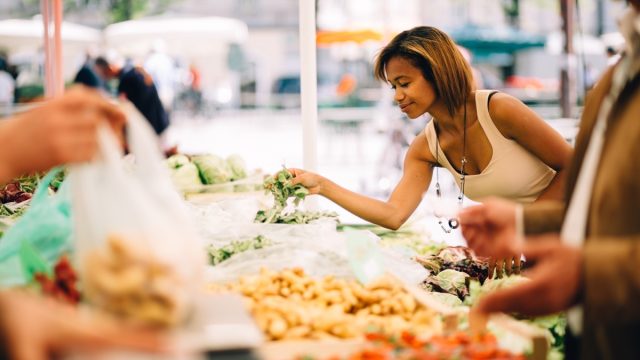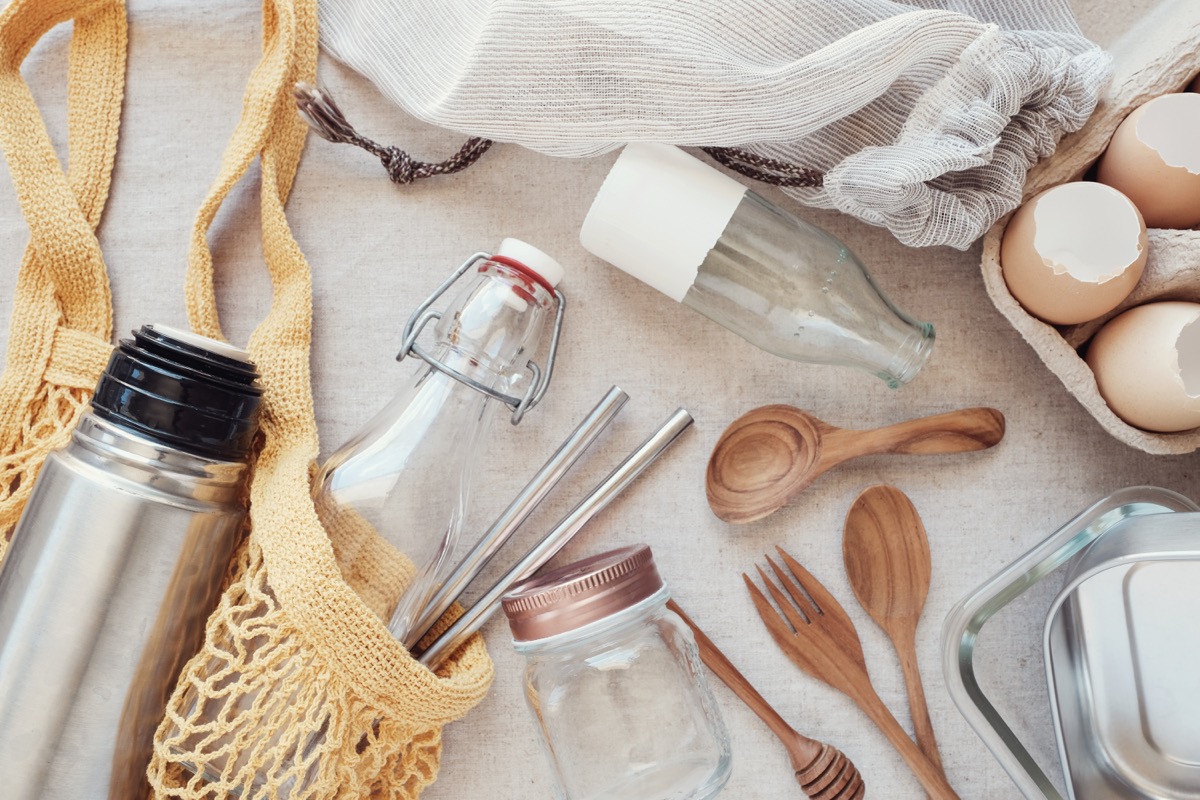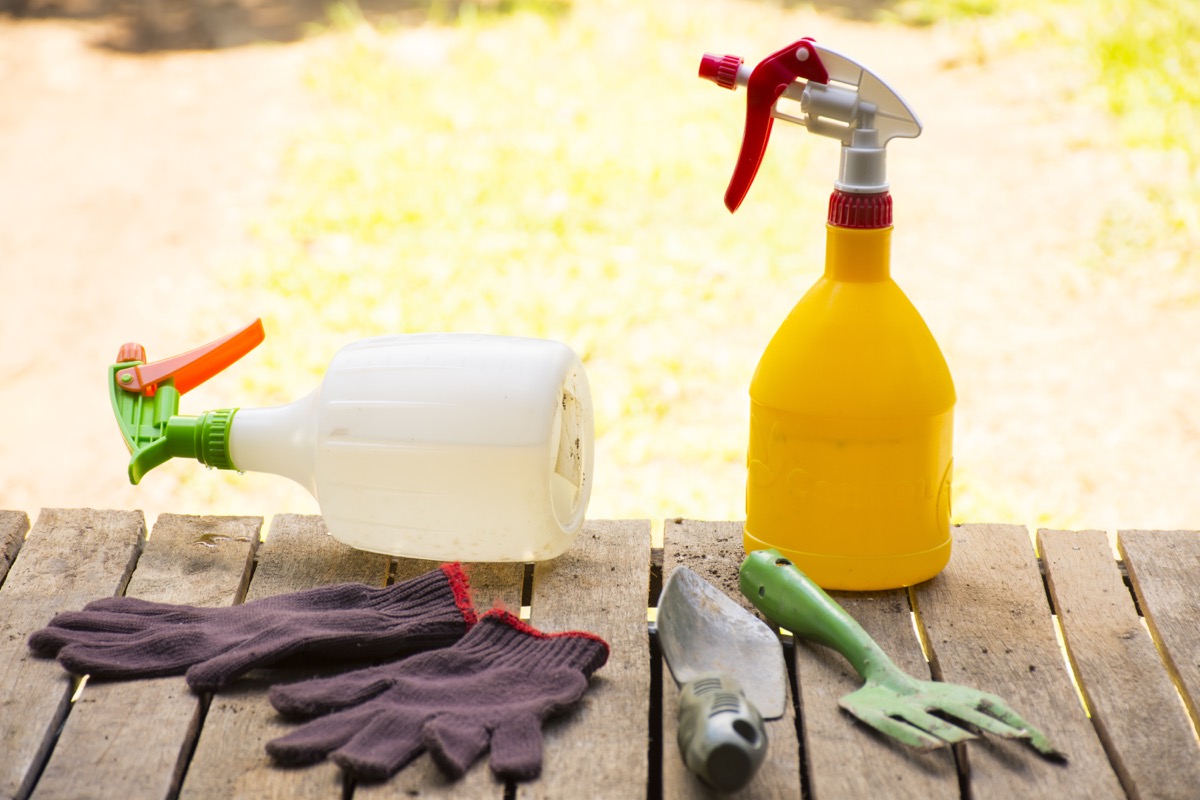15 Ways to Live an Eco-Friendly Lifestyle in Your 40s—and Beyond
Experts say these small changes can make a big difference for the environment.

With sustainability and climate change more important issues than ever, there's never been a better time to work toward living a more eco-conscious lifestyle. For some people, however, the ways to make their green-living dreams a reality aren't always clear—especially if you're over 40. Decades ago, environmentalism was not as prevalent a topic in our schools and everyday lives as it is today. So, if you're a forty-something eager to live a more eco-friendly lifestyle, but aren't sure where to begin, start with these easy tips from some of the world's top sustainability experts.
1
Use reusable food containers and straws.

Foregoing plastic bags at the grocery store in favor of reusable totes is a step in the right direction. But if you really want to do your part to help planet Earth, try using recyclable food containers, utensils, and straws, too.
"You may have seen painful videos of sea turtles found with plastic straws or forks up their noses. Using reusable materials is a small but effective way to reduce the plastic pollution that harms marine life," says Eric Otjen, a member of the SeaWorld Rescue Team. "Choose to drink straw-less, or buy reusable metal ones. Drink from water bottles instead of disposable cups. If you go out to eat, bring your own containers to take home leftovers."
2
Get an energy audit.

If you're worried about how much energy you're using, an energy audit from your local electric company can help you lower your carbon footprint—and your electric bills—in no time.
"Power companies are under instructions to encourage conservation," says green business profitability expert Shel Horowitz. "So they typically do energy audits for free—or for a $10 or $20 fee."
3
Turn off your outdoor lighting overnight.

Decorating for the holidays may make your house look festive, but if you leave those lights on for months on end, you could be having a deleterious effect on the environment. "If you put out holiday lights, consider putting out less than you did last year, and make sure you turn your lights off when you go to bed—overnight, nobody (or practically nobody) will be awake or outside to enjoy your holiday display," says Maya K. van Rossum, the original organizer of the Green Amendment Movement.
"Similarly, be sure to turn off all outside lights when you don't need them, and especially when you go to bed," she notes. "And think about putting LED lightbulbs throughout your home—they last longer and use significantly less energy. All of these little steps can be a big money and energy saver that reduces your carbon and pollution footprint."
4
Quit using chemical herbicides.

If you're eager to keep weeds and pests from destroying your garden, opt for fencing and good old-fashioned manual weeding instead of chemical herbicides and pesticides. "[Herbicide] glyphosate in the environment can be toxic to an array of living organisms including plants, animals, and microorganisms," says van Rossum.
She adds that research shows that frogs and toads are particularly at risk, even in your garden. Instead, "use non-toxic options, hand-weeding, or handheld burning for managing weeds."
5
Shop secondhand.

Keeping clothes out of landfills is a major environmental effort. It's why H&M, the Swedish fast fashion giant, has pushed a sustainability effort in recent years: Bring in your old clothing—even if they're not H&M brand—and they'll give you a 15 percent discount on your purchase.
Now, thanks to the proliferation of used clothing sites and apps like ThredUp and Kidizen, it's easier than ever to find high-quality used clothing, saving you money while saving the environment in one fell swoop. And if you're in need of a wardrobe upgrade, sites like The Real Real and Poshmark can help you get used designer pieces that might otherwise be prohibitively expensive at a serious discount.
"Prioritize secondhand clothing, then ones made with up-cycled or deadstock fabrics, then ones made with low-impact natural fibers, then clothes made with recycled polyester/nylon (avoiding ones made with virgin microplastics if possible)," suggests Kaméa Chayne, host of the sustainability podcast Green Dreamer. "
6
Join a community garden.

No garden? No problem! Getting a share of a community-supported agriculture (CSA) plot means you can enjoy fresh, local fruits and veggies even if you don't have room to grow them yourself—some farms and gardens even let you plant your own.
"Subscribe to local available organic and regenerative agriculture-focused CSAs to support local farmers, enrich our soils—and nutrition level in our foods—and reduce food waste," says Chayne.
7
Separate out compostable goods.

If you're simply tossing compostable containers in the trash can or recycling bin, you could be causing more environmental problems than you're solving.
"Compostable 'plastic' only works if it is hand sorted and sent to an industrial composting facility," says Michael Martin, CEO of Effect Partners and r.Cup. "If compostable plastic is put in recycling, it contaminates the entire load. If it is put into an incinerator, it releases CO2. If it goes into a landfill, it does not really compost for decades or centuries, and acts essentially like petroleum plastic. If it goes into the environment, our roadsides, or the ocean, it will not compost and acts like plastic."
8
Shop local.

From clothing to wine, any products shipped to you from overseas are bad for the environment, largely due to the fuel it takes for them to get to you.
"Buy local or fair-trade products," says Matthias Alleckna, an energy analyst at EnergyRates.ca. "Once you start purchasing eco-friendly products, you will be incentivizing a whole chain that is environmentally conscious, and that can conserve natural resources and cause a positive impact on the environment beyond your household."
9
Don't ditch produce just because it isn't pretty.

A browning banana or strangely-shaped squash won't actually harm you—but getting in the habit of ditching food just because it's not picture perfect can do serious damage to the environment.
"A lot of water, land, and resources went to growing and raising your food. Don't throw it out just because it looks ugly—try to use it in soups, sauces, or baking," suggests sustainability professional Leslie Ng, a business coach for eco-conscious entrepreneurs. Companies like Misfits Market will even sell you less-than-beautiful—but no less nutritious—organic produce at a discount.
10
Bring a mesh bag to the grocery store.

It's not just the plastic grocery bags you carry your food home in that are having a negative impact on the health of our planet—those produce bags are no peach, either. "Every week you're probably using a dozen little produce bags to take your veggies home," Ng says. "It's a lot of plastic that can easily be reduced by bringing your own mesh bags."
She adds that Amazon sells lots of sets of little mesh bags in assorted sizes. She says they're "not only for your produce, but carrying anything else you may otherwise want a plastic bag for."
11
Install a water filter.

Skipping the bottled water and installing a water filter can help you make a real positive impact on the environment.
"Peter Gleick, director of the Pacific Institute, says the true cost of bottled water is 'like filling up a quarter of every bottle with oil,'" says green architect Eric Corey Freed, author of Green Building & Remodeling for Dummies.
12
Replace your windows with energy-efficient ones.

If you're looking to remodel your home, make sure new energy-efficient windows top your list of must-haves. "If every home in the United States replaced their old, leaky windows, it would conserve enough energy to heat and cool 26.7 million homes a year," Freed says. "That's the equivalent of taking more than 323,000 cars off the road."
13
Pare down your party supplies.

Celebrating a work milestone, anniversary, or birthday? Choosing eco-friendly party supplies can make a major difference over time. "Instead of balloons at your birthday, use biodegradable confetti or rice paper lanterns," recommends Otjen.
14
Recycle your kids' art supplies.

If your kids are getting too old for those crayons they once loved, or their markers have dried out, don't drop them in the trash—recycle them! Crayola's ColorCycle program will recycle reused markers from school classrooms, while non-profits like The Crayon Initiative will recycle old crayons and distribute new ones made from recycled materials to art programs in hospitals.
15
Upgrade to energy-efficient appliances.

When your old appliances are shot, it's the perfect time to upgrade to energy-efficient models. "On average, any standard appliance you upgrade to an Energy Star model will reduce its energy use by 30 percent," says Freed. "For example, the refrigerator is the largest single energy user in your home. By replacing a 1990 or older model with a new Energy Star model, you'll save enough electricity to light your home for four months."
However, that doesn't mean you should get rid of your existing appliances if they're still functional. Getting that bulky new fridge or washing machine to your house also creates its share of pollution problems.
Additional reporting by Allie Hogan.





















